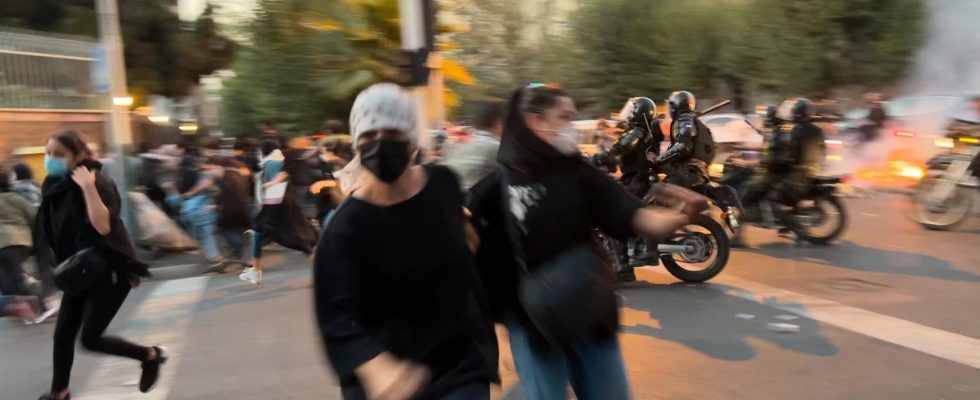1 / 4Photo: AP/TT
People who fall into the grip of the oppressive apparatus in Iran are brutally raped and tortured.
No perpetrators are being investigated. Several victims have been sentenced to death.
– The pattern we see indicates a large number of victims, says Swedish Amnesty’s Secretary General Anna Johansson.
Maryam and her friends had been taking part in one of many protests in Iran – removing their veils and chanting with the crowd – when they were arrested and taken away in a van.
The Iranian Revolutionary Guard kept Maryam in solitary confinement for two months. She is one of 45 people who testify about how the authorities oppress Iranians with sexual violence, in a new report by Amnesty International.
She tells how, after long interrogations, she was brutally gang-raped by several male guards, who, among other things, used a bottle.
“Even animals don’t do such things. I remember how two agents raped me. I was very small compared to them. After that I lost consciousness. I regained consciousness when they threw water on my head and shouted to some others to ‘come and get the dirty bitch,’” Maryam recounts.
“Used as a weapon”
The Iranian regime’s violations and oppression have been documented as much as possible since the nationwide protests broke out last fall.
– What is now emerging more clearly is how the Iranian intelligence and security forces have used rape and sexual violence as a weapon, with the aim of silencing protesters, preventing further protests and punishing people who challenge the political establishment, says Anna Johansson, Secretary General of Amnesty International Swedish department.
One woman, Shirin, tells how she was held captive in an empty apartment building and raped by ten men from the Basij paramilitary forces over a period of nine hours. Another, Fatemeh, testifies how she was gang-raped several times while locked in a school classroom for two weeks.
A school-age boy was raped with a water hose by an authority representative. Grown men tell how guards have raped them with batons.
Coerced confessions
Five of the victims that Amnesty has followed have been sentenced to death after being subjected to sexual violence and confessed to crimes after torture. One of them has already been executed and another died under unclear circumstances in captivity.
Victims testify how it has been difficult to seek care and help due to widespread stigma. Family members and others who speak up have been persecuted and harassed.
According to the human rights organization, there is systematic impunity for the perpetrators.
– A clear sign of that is that no allegations of rape or sexual violence have ever been investigated, let alone prosecuted, says Anna Johansson.
– Despite the fact that we have quite easily been able to identify a number of people who have these experiences, and know that at least three of them have made public complaints about the violence they have been subjected to, no one has been prosecuted.
Not completely silent
In September, on the anniversary of Mahsa Amini’s death, people gathered for new protests in Iran. Discontent has not been silenced, although the regime has reinstated the morality police and toughened penalties for women who do not wear the veil.
– The protests continue at a low intensity, but it is also very clear that the repression continues, says Anna Johansson.
– When the world’s eyes are directed elsewhere, it is important to show that we have not forgotten the situation that prevails in Iran and that we continue to show solidarity with girls, women and other oppressed groups there.
On Sunday, imprisoned human rights activist Narges Mohammadi will be awarded the Nobel Peace Prize for his work for women’s rights in Iran. The award is being accepted by her relatives as Mohammadi is imprisoned in her home country.
FACT Background: The protests in Iran
The biggest wave of protests to shake Iran in many years started with the death of 22-year-old Mahsa Zhina Amini.
Amini, a Kurdish woman from northwest Iran, was arrested by morality police in Tehran on September 13 for allegedly not wearing her headscarf properly.
Amini was taken to hospital after passing out and suffering what police say was a heart attack. This is contested by the 22-year-old’s family, who claim that she was subjected to severe violence to the head. On September 16, Amini died in hospital after being in a coma.
At Amini’s funeral in his hometown, spontaneous protests erupted, which then developed into a demonstration in which women took off their headscarves and chanted anti-regime slogans. The protests quickly spread across the country and came to be about much more than just the obligatory veil.
On many occasions, the demonstrations have been put down with brutal violence from the regime’s security forces.
Hundreds have been killed (more than 500 deaths have been confirmed) and tens of thousands have been arrested (it is estimated to be more than 20,000 in total, but it is unclear how many are still imprisoned).
Read more
